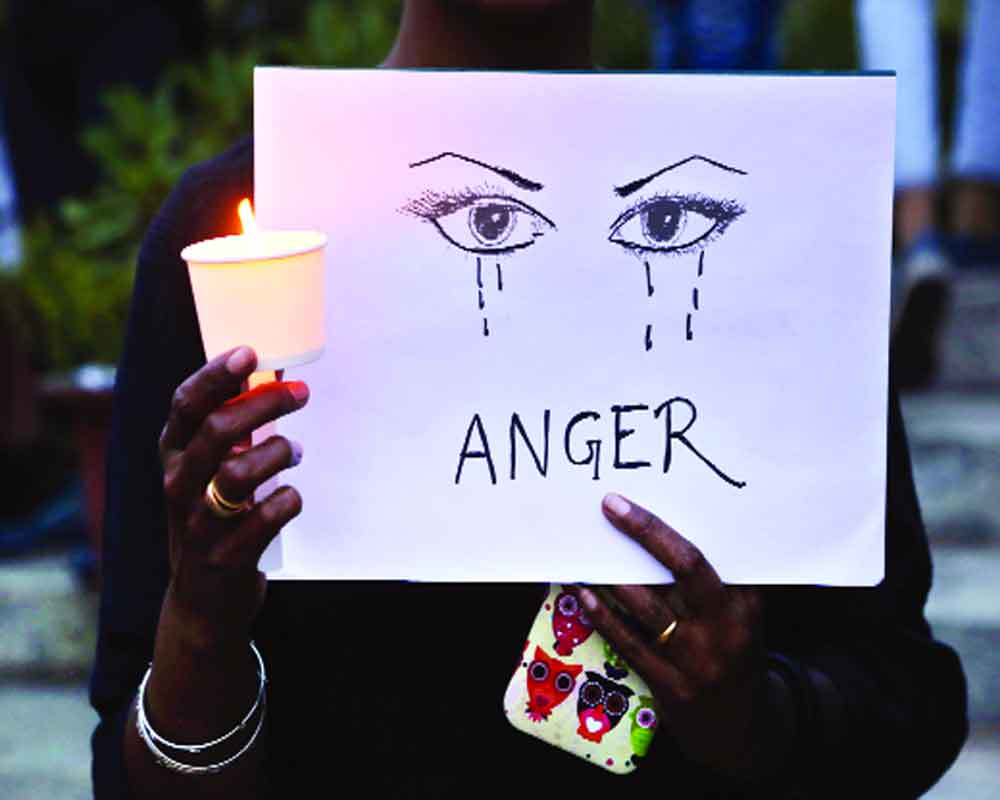The Hyderabad rape reminds us that a continuous responsive system is a bigger deterrent than one or two landmark rulings
No matter what the law, nobody bothers following it in letter and spirit. No matter how dehumanising the brutality of every rape, nobody goes beyond the tokenism of expressing shock and anguish in words, simply because that doesn’t require us to assume responsibility. No matter what the momentary trauma on our collective conscience, it doesn’t change our attitude, behaviour and mindset. We just look back in anger but are not angry enough to demand correctives. Instead we look at scapegoats — Was the girl right to be out alone at that time of night? Was the road deserted? Was the police patrol missing? So when news streamed in of the heinous rape and murder of a 27-year-old veterinary doctor by four truckers near a toll plaza of an expressway in Hyderabad, its public analysis revealed why we aggravate instead of rein in predatory behaviour. The Telangana Home Minister reacted by doubting the girl’s emergency response instincts, publicly asking why she called her sister and not the police, ignoring the fear psychosis that must have frozen her sensibilities as the men leered at her. And while the State police may have swooped down on the culprits the same day after the outrage snowballed across the country, its initial response was not just wanting, it was reprehensible. The family members of the victim had a tough time registering an FIR on the incident, which happened at around 9:30 pm, as two branches of the State police settled territorial jurisdiction. The complaint was finally logged in at 3 am, by which time precious hours had been lost in tracking the whereabouts of the dead girl. It is also a telling comment that the veterinary doctor was raped near the Cyberabad police station. It is even more shameful that netizens, who are so vocal about their outrage on social media, sought to lend a communal colour to the grossest human rights violation, saying it was orchestrated in “Muslim-majority Shamshabad” when the accused were all from Narayanapet district. If we cannot be responsible, at least let us not be irresponsible. Or turn apologists. It is precisely this insipidity that drives predatory behaviour. For on the same day, another woman’s charred body was found in the vicinity. And in Tamil Nadu’s Neyveli village, a 32-year-old widow was gang-raped by five men while she was returning home with her kin on a two-wheeler. One of the accused was even killed by the others over a dispute about who should take turns. Meanwhile, in Ranchi, a law student was gang-raped by 12 men at gunpoint in a high-security zone. The little solace is that because the rapes seemed like a baton run on a single day, all the culprits have been booked. But how many will ultimately be convicted and sentenced is the bigger question. Currently that figure is one in four nationally.
Rape accounts for 11.5 per cent of the total crime statistics. The 2012 Nirbhaya rape, which shook the conscience of not just the nation but the world, too, compelled our parliamentarians to strengthen the punitive justice delivery system. It led to some crucial amendments to the law, which included changing the very definition of “rape”, the establishment of fast-track courts, harsher punishments for the accused, with the provision of death sentence for extreme cases, and the abolition of two-finger tests. Besides, as the Hyderabad incident has shown, question marks remain on the use of the death penalty as criminals are now murdering their victims to destroy evidence. For the criminal, there is no deterrent. But yes, he can be stalled if deterrence is built into the system by fast-tracking procedures and ensuring swift justice. Conviction rates need to go up proportionately. At present, fast-track courts are no different from the usual courts in terms of case pile-ups and vacancies. A quick, fair and unbiased judicial set-up with requisite number of judges is a sine qua non. A continuously responsive system is a bigger deterrent than one or two landmark rulings. This will also spur institutional and judicial reforms. And last but not the least, as expressways become a reality in the heartland of India, we need more police patrols to keep women users safe. We can use technology to map their safety. A single woman on a two-wheeler was not out there on her free time, she was out on work.
























